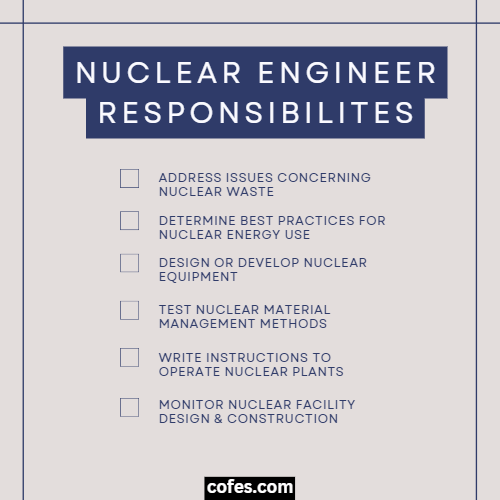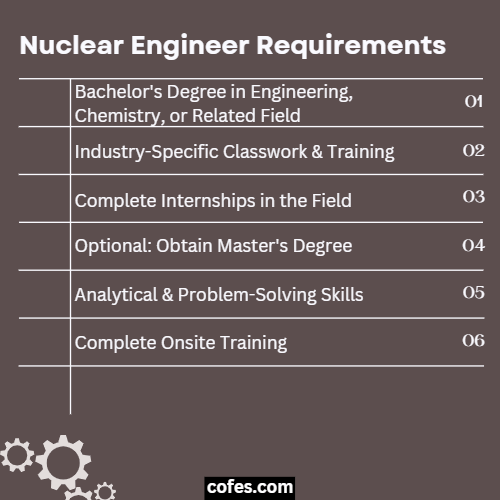A Nuclear Engineer is involved with nuclear energy transmission, conversion, and management of different atomic energy systems.
A Nuclear Engineer may work at a nuclear energy plant, or they may work for the government.
No matter where they end up working, Nuclear Engineers are expected to maintain safe nuclear energy practices.
If you’ve ever had an interest in science and how the world works, or if you enjoy working hands-on, a career in Nuclear Engineering could be for you.
Nuclear Engineer Information
| Official Job Title | Nuclear Engineer |
| Average Salary | $120,380 |
| Stress Level | High |
| Work/Life | Average |
| Job Satisfaction | Average |
| Career Advancement | High |
Nuclear Engineer Job Description

What is a Nuclear Engineer?
A Nuclear Engineer researches and develops programs and systems that harness and manage nuclear energy.
Nuclear energy or nuclear power is the usage of nuclear reactions to create electricity.
Currently, nuclear fission is used in nuclear power plants by using uranium and plutonium to create nuclear reactions.
Nuclear Engineers work long hours to develop nuclear processes, systems, and more with their vast nuclear energy knowledge.
What does a Nuclear Engineer do daily?
On a day-to-day basis, a Nuclear Engineer will work on several tasks, including creating safety measures for nuclear energy plants, performing tests on nuclear materials, developing nuclear equipment like radiation shields, and designing safety equipment to be used around nuclear energy and substances.
Depending on where you work, you may have different daily tasks.
Responsibilities, Duties & Roles of a Nuclear Engineer
One of the most critical responsibilities of a Nuclear Engineer is maintaining and managing safe nuclear energy processes.
Typical daily duties of a Nuclear Engineer include:
- Maintaining safe radiation levels
- Researching and developing radioactive processes
- Maintaining atomic energy safety standards
- Researching and developing nuclear technology in the medical field
- Analyzing thermonuclear systems
Nuclear Engineer Salary
Average Salary
The average Nuclear Engineer in the United States makes around $120,380 a year.
Starting Salary
An entry-level Nuclear Engineer can make approximately $65,486 when they are first starting.
Senior Salary
A senior-level Nuclear Engineer can make quite a bit of money. There are reports of salaries up to $142,212 per year, according to Salary.com.
How to Become a Nuclear Engineer
The Entry Level: Certifications, Training, and Degrees
Most entry-level Nuclear Engineer jobs will require at least a bachelor’s degree in nuclear engineering or something similar to another engineering discipline, physics, chemistry, mathematics, etc.
Many entry-level positions will require training or expect their employees to complete training during their college years through their classwork and internships.
While there aren’t any specific certificates needed to become a Nuclear Engineer, having specific certifications like Professional Engineer or Senior Reactor Operator Class can boost your credentials!
Possessing a bachelor’s degree can guarantee you an entry-level Nuclear Engineer position.
If you want career advancement, it’s important to consider graduate degrees.
Many corporate jobs will look for potential job candidates to possess a master’s degree for some positions.
Other Skill Sets, Requirements & Qualifications
Essential skills for Nuclear Engineers include analytical skills, math, problem-solving, attention to detail, and communication skills.
Nuclear Engineers should also stay on top of current scientific trends and news, especially media and trends related to their field.
How Long Does it Take to Become a Nuclear Engineer?
It should only take four years to become an entry-level Nuclear Engineer.
This accounts for the time it takes to complete a bachelor’s degree and some training.
If you are thinking about career advancement, it would be helpful to consider a master’s degree, which will take another year to complete.
If you consider taking it a step further and earning a doctoral degree, it could take up to eight years.

How Hard is it to Become a Nuclear Engineer?
Becoming a Nuclear Engineer can be more complex than most jobs.
Since you would be working with nuclear substances and nuclear systems, it takes a lot of schooling and training to make sure you are capable of working with atomic energy and its systems.
If you love science and are ready for a challenge, maybe a career in Nuclear Engineering is perfect for you.
Nuclear Engineer Career Paths
The Career Roadmap for Nuclear Engineers
A new Nuclear Engineering employee will probably start as an assistant or associate.
They will work closely with more experienced engineers to gain more experience in their early years.
Once a junior level Nuclear Engineer works an acceptable amount of years, they can advance into senior positions.
Projections for Growth in Nuclear Engineering
Unfortunately, the projected growth for nuclear engineering is negative.
According to the U.S. Bureau of Labor Statistics, within the next ten years, nuclear engineering will likely have an 8 percent decline in jobs.
This statistic shouldn’t discourage you from choosing a career in Nuclear Engineering because there will always be people retiring or changing jobs, making room for new employment.
In Summary: Is Nuclear Engineering a Good Career Choice?
While there may be a slight decrease in Nuclear Engineering jobs in the future, nuclear technology provides us with opportunities to develop in nuclear medicine, nuclear imaging, and more.
It may not be the fastest-growing career option right now, but it is a reliable career to get into, a great way to make money, and an excellent chance to advance your knowledge in engineering.
The choice is up to you!
Working Conditions
Can a Nuclear Engineer Work Remotely From Home?
Most Nuclear Engineers will work in an office within a nuclear energy plant, a consulting firm, or a federal government agency.
While a lot of work can be done in an office setting, a lot of work is hands-on.
As you might have assumed, this makes working from home challenging to accomplish.
A Nuclear Engineer would rarely work from home.
How Many Hours Does a Nuclear Engineer Work?
Most Nuclear Engineers work a 40-hour workweek, sometimes even putting in more hours than a typical workweek.
Can a Nuclear Engineer Work Part-Time?
In most cases, no–a Nuclear Engineer will be required to work full-time.
Nuclear Engineers will be required to work 40 hours a week or more for the detailed work they do.
What are the Average Vacation Days for a Nuclear Engineer?
Every company is different, but most Nuclear Engineers will receive two weeks of paid vacation until they reach a more senior position.
Alternative Careers & Similar Jobs to a Nuclear Engineer
- Safety Engineer
- Electrical Engineer
- Petroleum Engineer
- Engineering Technician
- Maintenance Engineer
- Natural Sciences Manager
- Neuroscientist
- Hydrologist
- Physicist
Nuclear Engineer Resume Tips
If you want to stand out from other Nuclear Engineers in a job interview, it’s essential to come prepared with a strong resume.
First, take a look at the job posting and see what skills the company is requiring for the job.
Pick the skills they provide that you possess, and make sure to put them on your resume.
Also, credentials and experience are essential in this field.
Highlight how much experience and knowledge you hold about nuclear energy and nuclear engineering, and your resume will stand out from the crowd.
If you need some help writing your Nuclear Engineer resume, consider researching job descriptions online to see what employers are looking for.
Also, consider researching what other people applying are putting on their resumes and try to improve yours.
Nuclear Engineer Interview Questions
Q1: How important are the following when dealing with nuclear energy: safety, rules, and procedures?
Why It Works: Safety, rules, and procedures are essential when dealing with anything nuclear, and any experienced or even novice Nuclear Engineer should know this.
Q2: Have you ever been involved in an emergency? What actions did you take?
Why It Works: This question is an excellent way for the interviewer to see how you handle issues and emergencies, which could happen quite often in this field.
Q3: What do you think is the future of nuclear energy?
Why It Works: Employers will get a chance to see how much you know about current nuclear energy research and information, and they will see a different perspective.
Q4: What are your greatest strengths in math?
Why It Works: A lot of nuclear engineering requires math skills (which is essential to list on your resume!) Be prepared to talk about your math knowledge in this interview.
Q5: How do you handle stressful situations?
Why It Works: As a Nuclear Engineer, you will probably experience many different stressful situations throughout your career.
Employers will want an employee who can handle themselves professionally.
Jobs Related to Nuclear Engineer
Are you thinking about a different career in the science field?
Consider the following similar jobs:
- Aerospace Engineers
- Chemical Engineers
- Physicists
- Safety Engineers
- Chemists
- Petroleum Engineers
Tips for Hiring a Nuclear Engineer
If you are a Human Resources Manager in need of a Nuclear Engineer, here’s what to look for in your perfect candidate.
Minimum Level of Education & Experience
All Nuclear Engineers should have at least a bachelor’s degree from a 4-year university.
While someone out of college will most likely only have internship experience, having prior experience would be helpful in this position.
Higher-paid positions should require a master’s degree or doctoral degree, depending on the type of position it is.
What Skills and Characteristics Should a Nuclear Engineer Possess?
When it comes to skill sets, Nuclear Engineers need to have critical thinking skills, the ability to process data effectively, vast knowledge of physics, math, and nuclear energy, and excellent communication skills.
